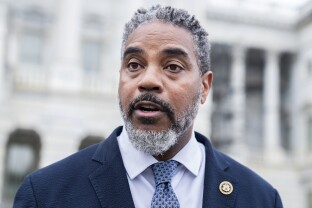As President Donald Trump and his allies stage an all-out assault on diversity, equity and inclusion efforts, Democratic operatives who champion DEI are getting worried: Could political groups be next?
“The threat is real,” Mondale Robinson, a political consultant who founded the Black Male Voter Project, told NOTUS.
“The idea of Donald Trump or anybody targeting Black Male Voter Project because we’re looking to bring equity to Black men, and especially as it pertains to representation in the electoral space, that reality is definitely something that we are aware of,” he said.
After taking office, Trump took steps to dismantle DEI efforts in the federal government and its contractors. He signed executive orders targeting these programs on Monday, and on Tuesday, he directed agencies to put DEI staff on paid leave with the goal to lay them off. The directive also stated agencies must cancel contracts related to DEI.
Political consulting groups haven’t been directly targeted, and within Democratic politics, they’ve even grown stronger as the party sought to appeal to a broader coalition. But with Trump in power and Democrats skittish about backlash, some Democrats and operatives fear that political groups that advocate for diversity could be next.
“With the Trump administration, we don’t know who they’re going to attack,” Rep. Pramila Jayapal, former chair of the Congressional Progressive Caucus, told NOTUS. “We all have to be ready that they’re going to go after people they perceive as political enemies.”
Antjuan Seawright, a veteran Democratic strategist, told NOTUS he’s spoken to operatives at Democratic groups who are panicky about how viable their work is. He said operatives are concerned their resources could be hamstrung and fear they could face lawsuits aimed at punishing them simply because of their political positions.
“I see them having a tough time,” Seawright said. “Every one of these groups are gonna have to rethink and recalibrate how they engage and what engagement looks like.”
Since 2023, when the Supreme Court struck down affirmative action at colleges, 86 anti-DEI bills have been introduced in state legislatures and Congress, according to a DEI legislation tracker created by the Chronicle of Higher Education. Fourteen of these bills were signed into law.
A bipartisan government spending bill gutted the House Office of Diversity and Inclusion in March last year. Vice President JD Vance, during his Senate days, introduced the Dismantle DEI Act, which was meant to limit the use of contractors with diversity policies. (That bill did not become law.)
Conservative legal groups aligned with Trump have set the stage for ending DEI programs in corporations. And then-Rep. Matt Gaetz and Rep. Marjorie Taylor Greene tried to blame the NAACP after two California cities shut down their rallies early last year.
Democratic political groups have mostly evaded Republican anti-DEI attacks. If anything, political groups that champion DEI policies grew last year as Democrats appealed to a wider coalition of voters.
Collective PAC, which supports Black political candidates, raked in 30% more in contributions in 2024 compared to 2020, according to OpenSecrets data. BlackPAC, an organization focused on Black voter engagement, doubled its fundraising in just a year from almost $17 million in 2023 to over $34 million in 2024, according to FEC filings.
Democrats worry that this momentum could stop. Many are concerned that anti-DEI efforts could turn off donors and stunt the growth some of these groups have seen.
“If we want those groups to continue to succeed, then the donor community needs to invest in them,” Rep. Jennifer McClellan told NOTUS.
Rep. Nikema Williams told NOTUS she’s worried that efforts to recruit candidates of color, particularly women, could stall if anti-DEI attacks weaken outside groups’ infrastructure.
“We never even got to a level playing field,” she said. “Even if Democrats were in charge, we still have work to do to get women of color to the same playing field.”
So what will Democrats do about this? Some said that continued advocacy is the answer, especially when some in the party are becoming hesitant about Democrats’ general approach to inclusion.
“No matter what the anti-DEI folks say, that’s the future of America,” Rep. Steven Horsford said. “They may not like it, but that part’s not changing, and we need people at every level of government to represent the diversity of the communities from which they would be elected.”
And Rep. Troy Carter had a stern warning for the Democrats thinking of running away from DEI.
“If you’re running from that, then you’d have to question your own inward thinking about how you feel about fairness,” he told NOTUS.
—
Tinashe Chingarande is a NOTUS reporter and an Allbritton Journalism Institute fellow.
Sign in
Log into your free account with your email. Don’t have one?
Check your email for a one-time code.
We sent a 4-digit code to . Enter the pin to confirm your account.
New code will be available in 1:00
Let’s try this again.
We encountered an error with the passcode sent to . Please reenter your email.


